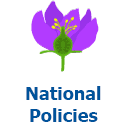Gender relations in Bangladesh have been undergoing a process of considerable transformation over the past thirty years as part of a broader process of economic transition and societal change. Women farmers made up 40 percent of the total agricultural labor force in 2010, with a 7 percent growth in women’s participation in agriculture between 2005 and 2010 (Akter et.al., 2015). Evidence shows that the wage difference between men and women in agriculture decreased from 40% to 30% for the year 2011/12 to 2013/14, which can be taken as a positive change (FPMU, 2015; BBS Monthly Bulletin, 2015), although the gap is still very high. Despite such progress, Bangladeshi women are still primarily considered to be unpaid family labor (56.3% of women in the labor force), and their contributions to agriculture are not fully recognized, neither in the household and communities nor at the national level (SFYP, 2015).
 Every country has developed, formulated, and decreed national policies related to rural advisory services. Find some examples here. If you are looking for a national policy from a specific country, please use the search function, selecting the category “National policies” and the tag for the country.
Every country has developed, formulated, and decreed national policies related to rural advisory services. Find some examples here. If you are looking for a national policy from a specific country, please use the search function, selecting the category “National policies” and the tag for the country.
Wednesday, 02 May 2018 14:36
Analyzing the Gender Sensitivity of Rural Advisory Services in Bangladesh
Written by Ingrid OliveiraDownload here4382 times downloaded
Published in
Research
Tagged under
Latest from Ingrid Oliveira
- Sustainable Undernutrition Reduction in Ethiopia: Training manual for Health and Agriculture Development Armies
- What Every Extension Worker Should Know - Core Competency Handbook
- Sustainable Nutrition Manual Part 3: Healthy Designs
- Sustainable Nutrition Manual Part 2: Healthy Environments
- Sustainable Nutrition Manual Part 1: Healthy Humans


